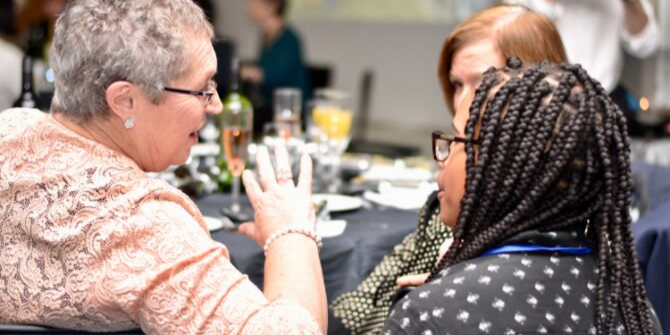As part of our Take Action’ Seminar Series we discussed how students and the LSE community can take action to support refugees and asylum seekers in the UK. If you weren’t there, don’t worry we’ve written a blog covering the key points made by our panel or you can check out the recording on CareerHub.
We were joined by LSE Fellow in Nationalism, Dr Joseph Downing from the European Institute. He teaches courses on global security, migration policy and minority rights, and specialises in French politics. We were also joined by LSESU STAR (Student Action for Refugees) president Charlotte Culley (LBB Law, 2021). STAR is a national network of student groups working to improve the lives of refugees in the UK, and the LSE branch has been incredibly active this year!
Our charity partner (and LSE Voluntary Organisation of the Year 2020) Salusbury World was represented by Yasmin Ali and Advice Worker at the organisation. Salusbury World work with refugee and migrant families helping children, young people and parents to realise their rights and potential. We were also joined by Angela Parkes, Volunteer Service Manager at the Baytree Centre, a social inclusion charity for women and girls based in the heart of Brixton.
What’s the difference between an asylum seeker and a refugee?
Dr. Joseph kicked off the panel discussion by stressing the importance of terminology in the field of migration, in a legal and administrative sense and as a discourse. A refugee is actually one of the few terms defined by international law within the 1951 Geneva Convention Article 1 (see quote). Whilst this is a clear definition, Dr. Joseph stressed the limitations. Firstly, it must be conferred by a state and not all states are signatory to this convention, thus they do not have this framework to apply to a refugee claim. Secondly, those who do have this framework have a range of willingness and capacity to deal with refugee claims.
The definition, borne out of post-WWII Europe, is also limited in its application to contemporary issues such as climate refugees. Whilst we are likely to see more people displaced across the world as a result of climate change, it is very unlikely that the scope of refugee status will become more liberal. It was also brought to light that many states who are signatory to the convention, offer only subsidiary protection. This is a lesser form of protection and is often limited by time.
However, the definition of refugee may be littered with issues, but the term asylum seeker does not actually have a legal definition itself. Asylum seekers are often those who might be seeking to lodge a claim to be recognised as a refugee and are waiting for the government to decide. A refused asylum seeker is someone who has had their claim for asylum refused, with the UK Home Office deciding that they do not fall under the 1951 Geneva Convention definition of refugee. An important difference between refugees and asylum seekers in the UK is that asylum seekers do not have the right to work and a single adult is given £37.75 cash per week for living expenses and no other benefits.
How has the situation changed over recent years with people arriving in the UK?
It is important to remember that a vast majority of displaced people remain internationally displaced within their states, or are forced into neighbour states. Of the 80 million forcibly displaced people across the world, 45.7 million are internally displaced and 26.3 million are recognised refugees as of mid 2020 (UNHCR, 2020). Turkey hosts the largest number of refugees at 3.6 million, Colombia at 1.8 million, Pakistan at 1.4 million and Uganda with 1.4 million of the worlds’ refugees. In fact 86% of refugees are hosted in ‘developing countries’, contrary to popular belief.
According to UNHCR, at the end of 2019 there were 133,094 refugees in the UK which equates to 0.26% of the UK’s total population. Asylum applications have actually seen an 18% decrease in the year ending December 2020, with only 29,456 applications in the UK. This is likely to have been impacted by the COVID-19 pandemic. The top five countries of origin of people seeking asylum were Iran, Albania, Eritrea, Iraq and Sudan.
What barriers do both asylum seekers and refugees face in the UK?
Working with refugees and asylum seekers at Salusbury World, Yasmin explained the xenophobia and racism that they receive in everyday life. Difficulties with access to education and health care are heightened by the current government hostile environment policies. Angela echoed this, explaining how the policies are not conducive with integration into society. For example, temporary accommodation means that many refugees and asylum seekers are moved around the UK, each time having to learn the local social norms and build a new understanding of how the community works. Both Yasmin and Angela stressed the difficulties of language barriers when accessing health care and education.
Charlotte also explained that when asylum seekers don’t have the right to work in the UK, it not only limits them financially, but asylum seekers are unable to be a part of society through the work force causing further isolation. These barriers make it hard for many to navigate the new environment they are in.
How has this changed regarding COVID-19?
COVID-19 has disproportionately affected the vulnerable within society, exacerbating existing disparities on the surface and those entrenched deep within public infrastructure. In terms of employment, the grey economy (informal jobs) was almost shut down and has been suffering ever since. Due to working restrictions and social barriers, refugees and asylum seekers often have precarious jobs, Dr. Joseph explained, reducing their income over the pandemic with no contract benefits to fall back on.
At Baytree a lot of women have lost their jobs, sometimes in an illegal fashion, and need legal and welfare advisors. Angela went on to explain how their service has moved towards addressing more practical needs, as a lot of the people they work with don’t have access to data or social media. Yasmin spoke of similar changes in their provision as they work more to address basic needs. Salusbury World made more foodbank referrals than ever before and instead of face-to-face tutoring, the team partnered with schools to identify children who needed laptops and technical support.
What is the biggest challenge that you face in your organisation?
Angela outlined the issues with connecting to their beneficiaries, as the face-to-face contact is not always an option. For a lot of the women that the Baytree Centre works with, the end of lockdown might not change the situation for them that much so their main challenge is maintaining any paths of contact that they already have and building on them.
Both Yasmin and Angela stressed the issues of fundraising and the uphill challenge going forward being providing the same service on reduced resources. With more people relying on an already struggling provision, raising funds has never been more important.
If students what to take action, how can they? Why are LSE students so passionate about this cause?
We know from talking to students that year-on year there is an increasing number of those interested and passionate about helping refugees and asylum seekers in the UK. Charlotte echoed this in the growth of her society and even through this year they’ve seen an increase of members. But why are students so passionate about this cause? For Charlotte’s committee it’s because they value the education they are receiving at university and they want to change the underrepresentation of asylum seekers and refugees in higher education. One committee member spoke about how they had seen how refugees and asylum seekers were treated in Japan, so wanted to make a change throughout their studies.
STAR has 3 main branches: campaigning, volunteering and educating. The campaigns are led by STAR National and this year they focused on These Walls Must Fall (campaigning for the right for asylum seekers to work in the UK) and Close the Barracks (XXX). The volunteering branch focuses on partnering with local London charities to provide LSE student volunteers. If you would like to find more look at their social media or get in touch!
We have worked with Salusbury World for years and we’ve always had great feedback from students who have volunteered with them! Their main volunteering scheme is a mentoring program in which you are paired with school child to provide academic and more general support. But Salusbury World also run after school and holiday clubs, where they visit museums and landmarks across London!
The Baytree Centre offers multiple volunteer internships which provide support to the mentoring schemes for young girls and planning trips. In normal times, there are often more ad hoc roles within the office which they hope to launch once the centre is open. The LSE Volunteer Centre works with lots of charities to help them recruit LSE student volunteers, so make sure you keep an eye on CareerHub for upcoming opportunities!
What resources would you recommend for students who would like to find out more?
The LSE Library has a wealth of resources covering this topic, so if you’re an LSE student or staff member you’ll have access to a lot of reading! But as an LSE student you also have access to Moodle pages for a 10 week course called GV4A5 ‘International Migration and Immigration’ which Dr Joseph runs. Take a look through the reading resources and recorded lectures for a great insight into contemporary debates and discussions within the field. Dr Joseph shared his email address for anyone interested in researching or doing a dissertation within the field (j.s.downing@lse.ac.uk).
Yasmin and Angela both encouraged students to read or listen to first-hand accounts of the experiences from refugees and asylum seekers themselves. The first step to building empathy is to hear their own stories, as so often they are dehumanised in public media. There is a wealth of literature and resource written by those about their experience, such as:
- The Lightless Sky: A Twelve-Year-Old Refugee’s Harrowing Escape from Afghanistan and His Extraordinary Journey Across Half the World
- 20:20 Stories of Moving Lineage. A multimedia arts and heritage project from Salusbury World Refugee Centre – cast a long lens over the personal memories of refugee families who arrived in the UK from 1999 onwards
- The Displaced: Refugee Writers on Refugee Lives. Written by Viet Thanh Nguyen who fled Vietnam in 1975, the book includes accounts from 17 fellow refugee writed from across the world.
- Teaching My Mother How to Give Birth. A poem collection by Warsan Shire about refugee’s experiences.
What are you feeling most optimistic about looking forward?
Our resident final question when hosting panels, is always this! We want to know what they’re looking forward to in the future and hold on to that hope.
- Yasmin: The weather and the vaccine roll out! Within Salusbury world the team is looking forward to delivering services face to face again and seeing the families for the first time in a long time.
- Angela: The team at Baytree are incredibly excited to reopen the physical Centre and provide a new 1-1 women’s support service in person.
- Joseph: It was clear that he was inspired by the social action on a local level took place during lock down. Watching an empowered community come together to care for each other
- Charlotte: The society is excited to be back on campus, hosting bake sales and informational stalls outside the SAW.





